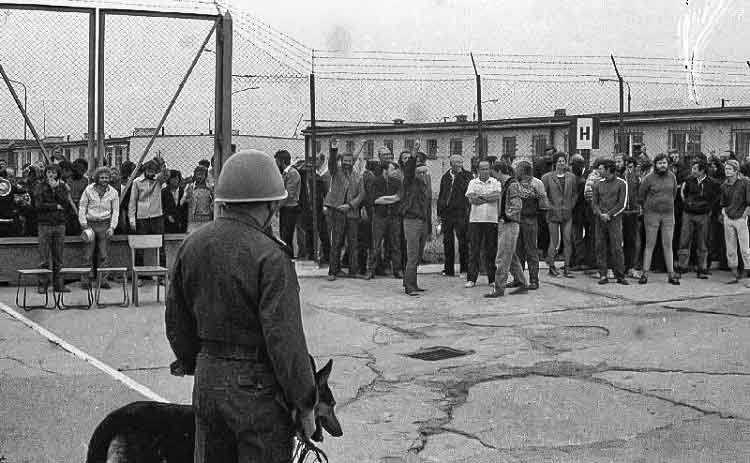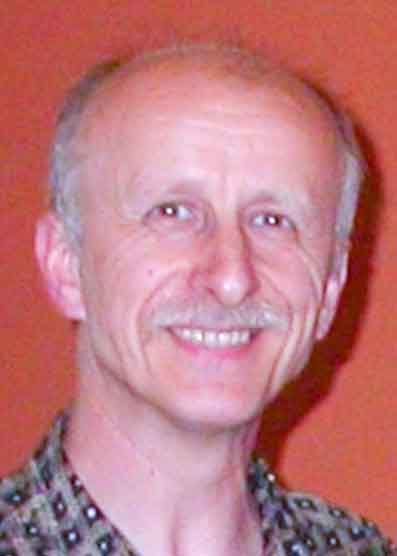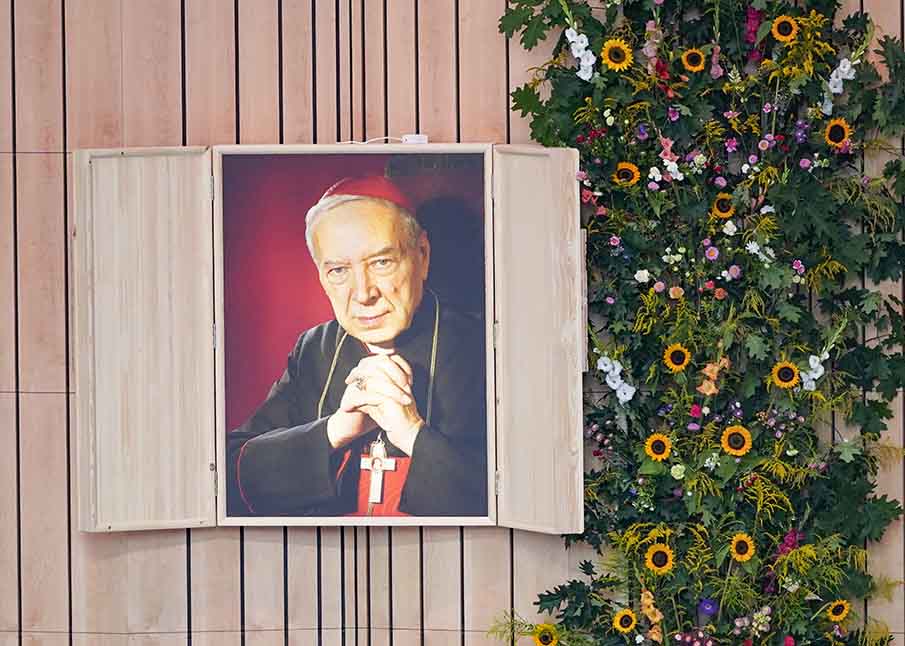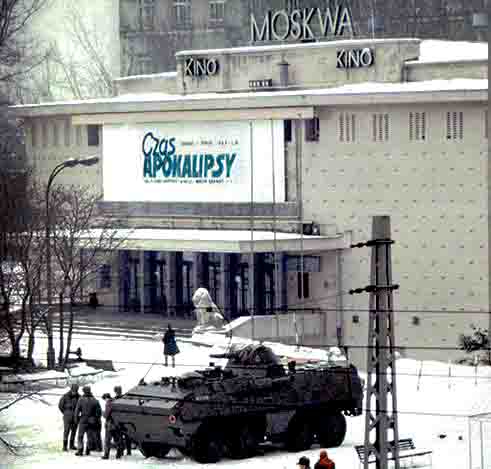The 42nd anniversary of the famous pacification of the protest of internees in the prison in Kwidzyn has just passed.
On August 14, 1982, in the Kwidzyn prison, the police and prison guards carried out a brutal pacification of the internment camp for "Solidarity" activists. As a result, over 80 internees were beaten, almost half of them suffered serious injuries. The direct reason for the protest undertaken by the internees on August 14, 1982 was the fact that their families were not allowed to enter the center on the designated day of visits. In response to the protest, the prison authorities and the police undertook a brutal pacification action.
In the internment camp located on the grounds of the Kwidzyn Prison, the martial law authorities held primarily Solidarity activists at the company and regional levels, mainly from north-eastern Poland, but also from the Łódź region, a total of about 150 people. The internees were primarily activists and full-time employees of "Solidarity" (115), NSZZ "S" Rolników Indywidualnych (4), activists of the Independent Students' Association (13), the Union of Democratic Youth (1), high school students (2, both from KPN), employees of independent publishing houses (2), criminal prisoners (4), clerics from the theological seminary, KPN (2), chairman of the workers' council (1) and a member of the Freedom-Self-Government-Independence Club (list according to Adam Golik).
Idyll before the tragedy
For us, after arriving from the Łowicz Prison (Isolation Centre), Kwidzyn seemed like Versailles: open cells, opportunities for all-day walks, volleyball and basketball courts, tennis. Inside, a common room, television (broadcasting the soccer World Cup from Spain). The guards were not too invasive or nosy. People were sunbathing, in short, total relaxation. Meals were served in pavilion no. 1, in our pavilion next door there was a common room and a library.
The guards themselves, accustomed to virtually unlimited power over prisoners, observing this relaxation in the facility, felt less free than the internees, but at least for the time being they somehow endured this situation. There was a constant swarm of boys hanging around the prison. I remember counting the internees from as many as 24 provinces (out of 49 existing at the time), which had its consequences for the families, whose journey from the edge of Poland to visit an inmate sometimes took up to two days (!). I don't remember exactly, but sister Elżbieta from Brzeziny, near Łódź, sister Ania from Paprotnia near Nowe Miasto nad Pilicą, and a friend from my studies at the University of Łódź (history, later sociology) Zbyszek Natkański also came to visit me. When someone visited you, it was a celebration, you were someone, you were not a "homeless mongrel" wandering around the prison that no one cared about.
I remember clearly that in the last cell I was in, cell no. 15, the toilet was located on the left side, right next to the entrance, separated by a curtain, and there was even a sink by the wall. This "privacy" in the toilet was a nice change compared to ZK (Zakład Karny, Penitentiary or Prison) Łowicz, where the toilet was located not far (one meter) from the dining table. I remember situations with the likeable Andrzej Kern (later Deputy Speaker of the Sejm), who often had stomach problems, during shared breakfasts — it did not look good.
The above-described prison idyll lasted during the command of the chief, Major Stefan Mikołajczyk, with whom the internees had previously negotiated many conveniences for themselves. There were also some frictions. On May 12, a limited protest took place in pavilion no. 1, when the internees from two cells refused to leave them for the duration of the "kipisz" (a term for methodical cell searches) ordered by the secret police. At that time, a special assault group arrived to help the prison service to pacify the prison riots from Sztum. As part of the repression, Andrzej and Zygmunt Goławski, Adam Kozaczyński and Radosław Sarnecki were accused. However, the planned court hearing did not take place due to the events of August 14, 1982.
The escape of an internee
Until July 1982, visits with families took place once a month and lasted an hour, unless Commander Mikołajczyk, at the request of the internee, extended the visit. As part of liberalization and the good will of the Commander, from July the visits took place collectively in the visitation room and in the square adjacent to it. The first visits in the new formula took place after my arrival in Kwidzyn on August 7 without any problems, but during the evening roll call it was noted that one internee was missing. It turned out that Mirosław Andrzejewski (from the Siedlce opposition) went free (without being detained by the guards) after the visit ended, together with his family. Apparently, even after taking his loved ones away, he wanted to return, but the guards did not let him in.
Frustrated Commander Mikołajczyk informed the militia and his superiors about this event only after 5 days (the wanted Andrzejewski was in hiding until early 1983, when he voluntarily turned himself in to the militia). Of course, permission for collective visits on Sunday, August 8th was withdrawn. This, in turn, caused our one-and-a-half hour protest, during which we sang patriotic songs, organized a festival of cat music, banged prison bowls and spoons against plates, chanting: "Let the families in!". The protest participants were photographed by the arriving officers of the MO (Milicja Obywatelska, literally Citizen Militia, meaning the police). Negotiations between our delegates and Major Mikołajczyk took place. The protest forced the prison commander to withdraw the last decision and restore the previous extended form of visits.
On the eve of the tragedy
According to tradition, each month of the introduction of martial law on December 13, joint singing of patriotic songs and lectures took place in the internment centers. A special program of ceremonies was secretly printed for August 13, according to which, on August 12 at midnight, we were to meet in the passage between the pavilions to sing appropriate patriotic songs and continue the demonstration the following afternoon. Which indeed happened.
On August 13th at noon we started with a roll call of the fallen, ending with a minute of silence for the victims of communism in Poland. Then we sang "Rota", "Boże coś Polskę", "Mury" and the popular "Pieśń Konfederatów Barskich". The guys pulled out Polish flags made of crepe paper on the prison lampposts, there was even a "Solidarity" banner on the roof of the building. The whole ceremony ended peacefully with an evening roll call, singing patriotic songs and rolling up the flags and banner. The guards did not intervene, and there were no clashes.
This simply unnatural sense of freedom among the internees in Kwidzyn and our successes in negotiating increasingly better conditions did not escape the attention of Commandant Mikołajczyk's superiors. It was on August 13 that he received his dismissal, which could also have been related to the escape of the internee Andrzejewski.
New Commander, New Order
The new commandant was the deputy of the Prison in Sztum, Captain Juliusz Pobłocki, who immediately abolished the negotiated extended visits, of which we, the internees (and our families) were not informed. The aim of the new prison commandant was to crush the existing freedoms, restore the traditional authority of the prison service and restore discipline. The internees, who had no clue about the changes, began to bring tables and stools to the visiting square after breakfast to receive families arriving from all over Poland. Around 100 family members of the internees were waiting behind the prison gate. However, the organized visits were limited and took place only in the visiting room at the "embassy" (the commandant's office).
The news of the ban on outdoor visits slowly spread. Around 10:30 a.m. a protest began by almost 150 internees singing patriotic songs, anti-communist shout outs could be heard. Then the prison "educator" Edmund Młotkowski suggested that a three-person delegation of internees should go to talk with the commandant. The delegation, consisting of Roman Jarmuszkiewicz (driver, Sieradz, my colleague from ZK Łowicz, today Sweden), Andrzej Bober (formerly ZK Iława) and Włodzimierz Przybyłko (formerly ZK Zielona Góra, Głogów, Ostrów Wlkp., Gębarzewo) demanded that the negotiated agreements be respected, with particular emphasis on enabling visits for a larger number of families arriving (often from far away) that Sunday.
The commander is preparing the pacification
Pobłocki feigned meetings, consultations, dragged out negotiations, and at the same time secretly brought in units to suppress the rebellions. Soon a well-armed assault group from ZK Sztum (22 combat officers) with batons, helmets and shields appeared, as did fraternal militia units from Kwidzyn (30 combatants) and ZOMO from Elbląg. The protesters were bravely recorded by a police photographer in plain clothes.
The situation among the previously peaceful protest participants began to change dangerously. At first, we continued our previous form of protest by making noise and singing patriotic songs. We received news from families gathered in front of the prison gate about the approaching “attack” of ZOMO (Zmilitaryzowane Oddziały Milcji Obywatelskiej, Militarized Police), MO, other units, and even the Fire Department. Several guys, including Władysław Kałudziński, Michał Lubowski, Mirek Duszak, and Radek Sarnecki, climbed onto the roof of the utility building and some of them went down to the area marked off on the other side of the demarcation grid and then along the roof to the main gate. There, they established contact with the waiting families, receiving from them a list of people waiting for visits, then retreating to the 2-meter demarcation grid marking the so-called safety zone. Right behind them, from our side, someone managed to cut through the grid. Then about 50 internees passed through the opening created in this way towards the main gate. Now I understood that the situation was becoming dangerous and, having slipped out of the hands of the organizers, was changing its character definitively.
Some families moved to a hill, an elevation next to the prison wall, to get a better look at what was happening to the protesters. At that time, the commander of the MO from Kwidzyn who arrived here interrupted the visits with families taking place in the hall, and by chasing the families away from the area adjacent to the prison, he simultaneously blocked the access roads to the ZK Kwidzyn.
Something had happened just before that heated up the atmosphere among the protesters. Namely, one of the officers hit with a baton the outstretched hands of a child under the main gate, who shouted "daddy" towards an internee. On the other side of the gate, families pushed away by force threw apples, eggs and insults at the policemen. It should be added that some of the internees also took photo documentation of the protest. Events were coming that would be impossible to forget later...
The Pacification
At around 12:15, 55 prison officers (35 from ZK Kwidzyn, Elbląg, Iława and 20 from ZK Sztum) received the order to "attack" and began a pacification action by pushing the protesters towards the prison pavilions with a motor pump drawing water from a retention tank. It is interesting that there was no command to "disperse" and they immediately started the attack. We intoned the national anthem. The water hitting under pressure, the barking of a German shepherd (without a muzzle) and the constantly pressing line of officers with batons pushed us back.

Kwidzyń Prison, 1982. (Source: dzieje.pl)
As the nerves and the psychosis of danger, threat, and batons clubbing grew, only screams of pain and shouts of "Gestapo", "torturers" could be heard... Those provided with tables and stools intended for visits withdrew more safely, as even an aluminum bowl offered welcome protection against the penetrating and tearing lash of water directed at the face. The attackers also showed creative ideas, throwing at the retreating people whatever they could, from shoes lost by internees or cans of food left over from a meeting with their families.
However, at this stage, there was no ferocity that would result in serious bodily harm. However, some of us got hit hard. Adam Kozaczyński, who was captured, was clubbed hard, and only Andrzej Busse helped him to retreat. Krzysztof Zadrąg almost lost consciousness. However, Władysław Kałudziński was beaten the most, as he remained at his observation point on the chimney of the outbuilding for too long. Surrounded, they beat and kicked him until he lost consciousness and woke up only in a hospital (an old oppositionist, Marek Chwalewski (RWD) from Pabianice, testified about this in the later trial). Roman Jarmuszkiewicz, Piotr Bączyk, Arkadiusz Kutkowski and Marek Chwalewski were also severely beaten.
A witness to these events, called to extinguish the “fire”, the commander of the Fire Department from Kwidzyn, Roman Gołuch, recalled:
I drove into the camp. The local guards were already standing with hydrants in the courtyard. The guards were pushing the internees into the pavilions. A man was standing on the roof. Two policemen pulled him down and started beating him. Club, kick, club, kick. They were treating him terribly. My boys started crying. The sight of bloodied people and policemen abusing them was slowly exceeding the limits of my endurance. I had seen many misfortunes in my life, but all of them were random accidents. This time I witnessed brutality.
The pacification managers ordered the Fire Department to additionally use the fire pump to sweep away the protesters, which was categorically opposed by Commander Roman Gołuch, who sent the truck back to the base, provoking the fury of the MO Commander and the prison Commander. Gołuch later paid for this by losing his job and receiving a yellow slip, because of which he could not even find a job in the Tri-City, where the unemployed man moved with his family. Only because he behaved like a true Polish patriot.
During a momentary break, several internees built a barricade from a ping-pong table, a dining room table, and a grate in the passage between the pavilions. People being driven away tried to hide in their cells. At the entrance to the passage, there was a guardhouse, where the guards resided. Unfortunately, two of them, Józef Gutowski and Reinhold Brzezicki, out of spite, closed some of the cells and not everyone could hide in theirs, becoming easy victims and targets of the degenerate beaters who were just breaking into the building. Jan Łodyga tried unsuccessfully to get to his cell no. 4, he tried no. 3, unfortunately again bad luck, it was closed. Then, under cell no. 2, he was caught by 5 insatiable torturers who beat him "religiously" and shouted: "kneel under the cell and pray, son of a bitch" (after all, it was Sunday). The hunt for game yearning for freedom began with the slaves of the totalitarian system.
In the whole madness of the confusion during the fights, it was these two guards (locking the cells) who were cut off from their comrades who were attacking the main barricade. In this thicket of emotions, fear, emerging rage and hopelessness, the words were uttered right next to me: "take these two whores hostage!" From what I could still recall, the guards were threatened with lynching by desperate, mentally shaken colleagues. It's scary to think what would have happened after that. I remember how, together with other colleagues from ZK Łowicz, Roman Jarmuszkiewicz, Henryk Maciejewski and Grzegorz Rachaus, we tried to defend these two SOBs, which, thank God, we managed to do.
Bestiality and cruelty
The next phase of the protest's pacification operation bore the apt name of "searching". Several-person groups of secret police fighters began methodically beating and humiliating the internees. The communists always placed great emphasis on culture and education, unfortunately this time it was confirmed. The prison "educator", Edmund Młotkowski, tried with great dedication to spread the red culture of the demoralized system by indicating people designated for special beatings.
That day, the guards were releasing all the stress they had accumulated in their contacts with the internees by sweating their brows, not sparing their strength in the service of the socialist fatherland. The pacification inside the prison lasted from 12:40 to 14:00, and the tireless defenders of the criminal system were selflessly hammering their ideas of order and progressive equality (with the floor!) and the leading role of the club into our heads; not only in our heads, but also everywhere.
Enraged, or perhaps drugged, the torturers organized ingenious "health trails" in the flooded corridor, opening cells one by one and chasing the internees to a thorough personal inspection in the recreation room (opposite our cell!), in order to thoroughly search their cells at the same time. Then, people were called out one by one by name from the recreation room, where a unit for pacifying prison riots was lined up in two rows with batons ready for a "massage", inviting them to take part in the traditional "health trail". The internee was to run through a hail of batons and occasional kicks among uniformed fans of the old regime. There were different schools of thought on how to behave, whether to protect your head with your arms while running and expose your kidneys and other organs. The most important rule was not to fall or let yourself be knocked down, because then nothing would help you. Any hesitations or doubts of the chosen interned one were to be dispelled by a German shepherd without a muzzle barking in front and by the equally friendly encouragements of the waiting torturers.
Fleeing from the degenerates charging at the barricade at supersonic speed, we rushed into our "student" cell and all froze motionless, stopping our breathing. The only sound we could hear was an unbearably and dangerously loud fly flying around. We listened anxiously for voices and footsteps. We heard the clatter of cell doors being opened one after another, a cannonade of screams and shouts, a dog barking, then wailing, the sound of blows being dealt, stomping and groans, even the sobbing of colleagues running along the "health path". Even the clatter of falling bodies, all of this interrupted by loud bursts of laughter from the tormentors having a good time. We were very lucky and survived thanks to the fact that we had previously voluntarily occupied a cell that in the prison plan was designated as a dining room. That is why those familiar with the layout of prison cells left us alone, thinking that there was no one there.
Zenon Szachowicz (Zielona Góra) recalls that before leaving his cell he was ordered to remove the portrait of Lech Wałęsa and the inscription "Solidarity" from the wall, and when he had done so, he was ordered to stretch his hands forward, after which he was beaten with a baton, saying: "this is for stretching out your hands against the communist authorities". Another internee (Jerzy Pogłodziński, Zielona Góra) was first hit in the head with a baton, and then it was held under his nose so that he could familiarize himself with "what the people's power smells like", after which they began to bombard him with batons.
The prison snitches probably tortured the internees from cell no. 8 the most, whom they remembered from the previous revolt, on May 12, 1982. The inhabitants of the cell were dragged by their hair and beards, beaten and kicked. The Goławski brothers (Siedlce), the student Radek Sarnicki (Zamość) and Ryszard Piekart (Siedlce) were imprisoned there. Andrzej Goławski was beaten and kicked at first in a squatting position, but when he fell down after being hit in the temple, he was kicked in the head and spine. Ryszard Piekart was treated similarly, and was beaten even after he stopped moving. After being beaten several times, officer Zbigniew Puławski tore off a photograph of Pope John Paul II and kicked a fallen cross. After fifteen minutes, the beaters returned to the cell and began beating him brutally again. Andrzej Goławski then lost consciousness twice, but they continued to beat him with wooden batons on his legs, torso and genitals. Of course, in order to show the internees even more inconveniently that they were the masters of life and death, the torturers furiously threw out everything from the cupboards, boxes and jars as part of the search, mixing e.g. flour with sugar and salt.
The very young (high school student) Sarnicki later wrote about the attack:
At one point I was thrown off the bed onto the floor. They started beating and kicking me again. I remember clearly how one of the officers pressed my chin and cheek to the concrete floor with his boot, and another one stood with both feet on my chest. I was unable to move and I couldn't breathe.
Radek weighed 53 kg, was slim, wore glasses – 3.5 diopters, he was a perfect candidate for bullying by armed, tall guys...
In the evening, after the beating, they began a methodical search, which was conducted by two groups of 11 officers each. This time, the victims included 14 small radios, heaters, knives, electrical cables, "cement mixers" and illegal literature. We cheered ourselves up by joking: "Well, it's not so bad, maybe one of them can read."
The beaten people had mainly head injuries — concussions. They also showed completely blue legs, arms and backs, not even a piece of healthy flesh was visible. Some of them did not receive medical help for many hours. One of the beaten people was not taken to the hospital in Gdańsk until the next day. He was in a coma. In Kwidzyn they could no longer cope with him.
Kałudziński said.
The torturers used batons, and when someone fell, they kicked him. Among the acquaintances, Andrzej Tomaszewicz from Sieradz was beaten, then fell after a brutal beating, his friends picked him up, but he fell again with a heart attack, he was taken to a hospital. Roman Jarmuszkiewicz who complained of a spinal condition before the beating, also got hit hard. I knew these two from ZK Łowicz.
When the next day the suffering, beaten-up (several internees had been taken to the hospital earlier) demanded to see the prison doctor, "brave" armed stormtroopers appeared at the door and, waving their batons with a smile and feigned concern, asked: "Is there anyone feeling unwell and needs help, a doctor...?"
We were at a loss for words and they were met with profound silence.
When the new commandant proudly and smilingly paraded through the pacified prison, he was met with another surprise — from our side. The internees announced their demands for punishment of those guilty of the beatings, for the establishment of a special commission to investigate the events of August 14, for the removal of commandant Pobłocki and for the admission of representatives of the Polish Episcopate and the ICRC (International Committee of the Red Cross).
A hunger strike was proclaimed as a means of exerting pressure.
Translation from Polish by Andrew Woźniewicz.









